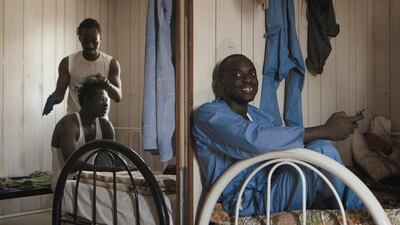American director Adam Sobel says he wants the audience to feel empathy, not sympathy, for the subjects of his film, The Workers Cup.
His documentary – about football tournaments for the migrant labourers from Africa and Asia building Qatar’s 2022 Fifa World Cup facilities – had its world premiere at Sundance last Thursday as part of the opening-day line-up for the 33rd edition of the film festival.
“The conditions in the labour camps have got plenty of media attention already and people know,” says Sobel, who worked in Qatar for five years as a journalist and TV news producer. “What we were much more interested in exploring was the psychological duress these guys live under.”
The Workers Cup is not intended to be an expose, he says. Rather, he wanted people to get to know some of the workers, preserving their dignity while revealing "the failing of the system, which is uncaring".
He adds: “I think that is the emotional part of the film and I hope that’s what people take away from it when they watch it.”
Sobel had been covering stories about migrant workers on World Cup sites for several years. That helped him build friendships and gain access to the Gulf Contracting Company’s Umm Salal labour camp.
There, he and a small crew followed a group of workers caught up in their own version of World Cup fever, as they competed in football tournaments launched by the construction companies in 2013 as a moral booster and public-relations exercise.
“The tournament is not speaking to people’s everyday needs and I think that should be the government’s mandate, not a three-week tournament,” says Sobel.
He and the film’s producers, Ramzy Haddad and Rosie Garthwaite, made their film “by luck and by pluck”, says Sobel.
For the first two years, they did not tell anybody what they were working on, for fear of being shut down, even though the film was made “with the full permission of the company involved, as well as the blessing of some very important people who we won’t name, who don’t want to be named”.
Good timing also played a part. Filming finished before restrictions were placed on media reports about labour camps for World Cup sites, says Haddad, who grew up in Qatar.
The film offers a candid look at the bleak life in the gated camp outside of Doha, where labourers speak frankly about isolation, loneliness, homesickness, separation from their families, and the economic servitude they signed up for that keeps them in the camp when not working long hours.
Sobel says that while much of the media coverage has “seen them as victims”, he wanted to make a film the workers would be proud of.
“I think there’s much more to their story than their sacrifices, their hopes, their dreams,” he says.
“All of that has to be honoured so that people can relate to them.”
So the film balances sobering scenes in stark dormitories with scenes of joy, camaraderie and humour, and rousing on-field images of a football squad made up of men with passion for the beautiful game, despite varying levels of ability.
Kenyan Calton, for example, is a terrible goalkeeper, but his easy charm is infectious.
“I feel very famous,” he says of being part of the team. Yet he happily steps aside to make way for Samuel, a better player who arrives at the camp from Ghana.
When the GCC team wins, their joy is thrilling and life-affirming. When they lose, their sorrow is palpable.
“People come here to fulfil their dreams,” says Kenneth, 21, who arrived in Qatar from Ghana expecting a much different situation.
A semi-professional footballer at home, he says he was lied to by a recruiter, who told him scouts in Qatar would sign him to a professional career.
“This is what I find devastating about this,” says Sobel. “I think there’s an exploitation of people’s expectations. It’s not just an exploitation of their labour – it is actually almost worse. It depletes them of the morale they came to the country with and it kills motivation to succeed in life.”
Sobel hopes the football continues for these men, whose optimism impressed him.
“Even after we finished filming they were desperate for the next tournament to come around because it was an escape,” he says.
“Our biggest hope is that [the film] has an impact in the country, that it creates a conversation, not a polemic, that we actually have a chance to have the characters’ voices heard.”
artslife@thenational.ae

